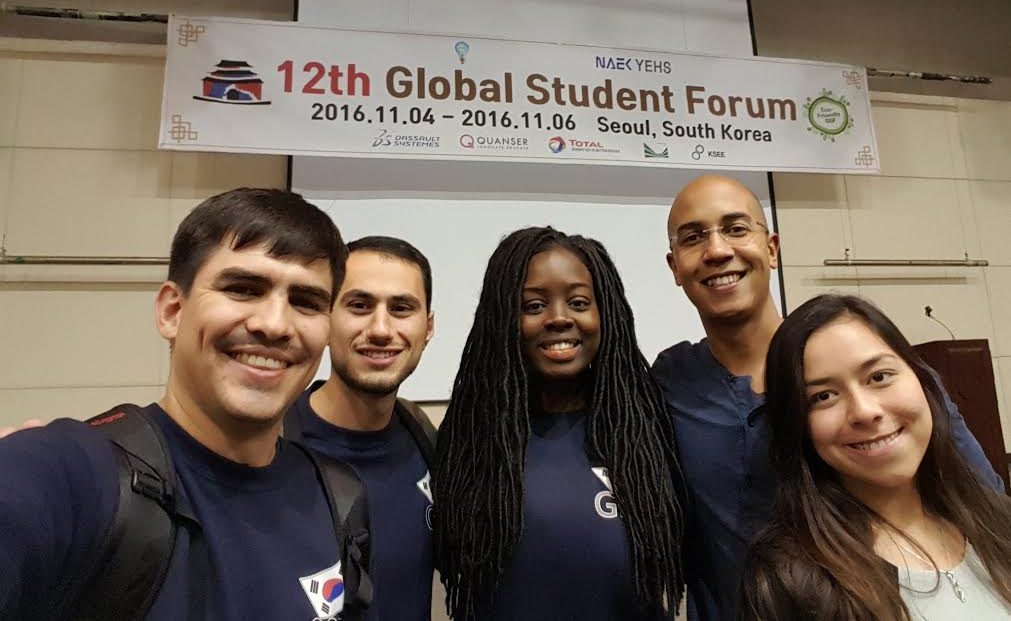A UMBC delegation of Ph.D. students and their mentors traveled to Seoul, South Korea in early November to discuss with international colleagues how engineering and engineering education can improve lives at the 2016 Global Student Forum (GSF) and World Engineering Education Forum (WEEF).
The GSF theme of “global partnership for development” included four tracks that aligned with United Nations’ Millennium Development Goals and the National Academy of Engineering’s Grand Challenges. Students from around the world collaborated to tackle assigned tasks on those tracks. Gloria Opoku-Boateng, Ph.D. student in information systems, worked with her team to create a community empowerment program to reduce extreme poverty and hunger. The project, dubbed “iHelp,” won its category at the GSF.
For Saadi Habib, Ph.D. student in mechanical engineering, speaking with students from more than 15 countries through the project-based GSF program was eye-opening. “I realized what I see as a problem and a solution in the U.S. is not necessarily true in other countries or even in the entire U.S,” he shared, noting that challenges that appear purely technical can have multiple, context-dependent solutions.
The GSF program is connected to the international Student Platform for Engineering Education Development (SPEED) and was designed to complement the larger WEEF gathering, which took place just afterward and focused on “Engineering Education for Smart Society.” There, UMBC participants gave research presentations and joined in panels focused on pedagogy and mentoring.
Habib and Hector Medina, Ph.D. student in mechanical engineering and Meyerhoff Graduate Fellow, presented on how to develop a successful engineering laboratory course. Renetta Tull, associate vice provost for graduate student development and postdoctoral affairs, spoke on inclusive engineering.
Opoku-Boateng delivered a research talk on her research in engineering artificial intelligence in consumer apps for personalized pain prediction and management. She reflected, “Presenting here helped me understand that clearly presenting solutions to engineering problems is as important as finding those solutions.” She also seized the opportunity to receive and offer mentoring, sharing her experience with navigating the transition from undergraduate to graduate education.
Unable to attend the event, but present in the minds of his colleagues, was Adegboyega Akinsiku, Ph.D. student in human-centered computing, who was scheduled to speak about project-based learning. Shortly before the conference, Akinsiku discussed the importance of mentoring at the White House Conference on Inclusive STEM Education for Youth of Color. His mother, who proudly attended the White House talk, passed away shortly before the Korea trip.
Akinsiku’s experience at the White House, and Opoku-Boateng, Habib, and Medina’s time in Korea, left them with a strong sense of mission. Getting a clearer sense of the range of challenges and possible solutions out in the world, “I start to think with a broader perspective of designing, building, engineering, and developing technology for social good,” says Opoku-Boateng. “That is what truly makes a mark.”
The South Korea trip was the fourth in a series of experiences organized through the International Engagement and Broadening Participation in STEM project, spearheaded by Renetta Tull and sponsored by the UMBC Graduate School and some of its initiatives that are funded by the National Science Foundation. The participating UMBC students are also all part of the LSAMP Bridge to the Doctorate program and PROMISE, Maryland’s Alliance for Graduate Education and the Professoriate (AGEP). Other UMBC mentors and participants included Julia Ross, dean of the college of engineering and IT; Tim Topoleski, professor of mechanical engineering; Autumn Reed, program coordinator for faculty diversity initiatives; and Yarazeth Medina, PROMISE coordinator.
Image: From left to right, UMBC graduate students Hector Medina, Saadi Habib, and Gloria Opoku-Boateng; David Delaine, assistant professor of engineering education at the Ohio State University; a student attendee from Colombia. Photo by Hector Medina.
Tags: COEIT, GraduateSchool, Innovation, IS, MechE

